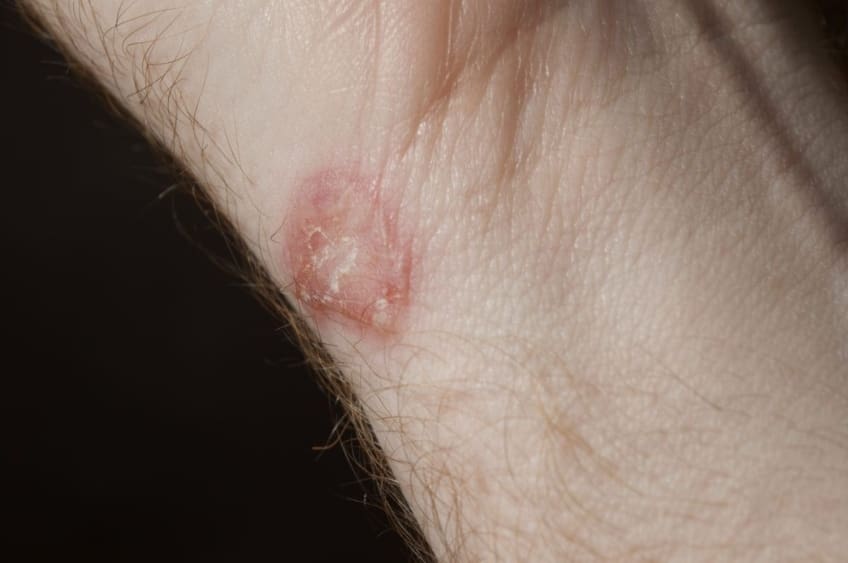
What is ringworm?
Ringworm (tinea) is a fungal skin infection that appears as a rash in the shape of a ring. But there is no worm involved. Anyone can get ringworm, but it is most common in children. If you have ringworm, it usually appears in multiple areas of your body. If it’s restricted to certain areas of your body, it may be called something else. For example, ringworm on your feet is known as athlete’s foot (tinea pedis). If it’ appears on your inner thighs, groin, or buttocks, it is known as jock itch (tinea cruris). Ringworm of the scalp is called tinea capitis. Ringworm of the beard is called tinea barbae.
Symptoms
Ringworm can affect one or more parts of your skin. It can even occur on your fingernails and toenails. Symptoms may vary based on the infection’s location. Common symptoms for general ringworm include:
- Red rash shaped like a ring
- Clear skin within the ring
- Itching
- Red, dry, or flaking skin
- Swollen, raised, or blistered skin
- Loss of hair at the site of the rash
Ringworm of the feet (tinea pedis or “athlete’s foot”) symptoms include:
- Red, swollen, peeling, itchy skin between the toes (especially between the pinky toe and the one next to it)
- Rash and blister on the sole and heel of the foot
Ringworm of the scalp (tinea capitis) symptoms include:
- Scaly, itchy, red, circular bald spot that can grow in size and multiple spots
Ringworm of the groin (tinea cruris or “jock itch”) symptoms include:
- Scaly, itchy, red spots, usually on the inner sides of the skin folds of the thigh
Ringworm of the beard (tinea barbae) symptoms include:
- Scaly, itchy, red spots on the cheeks, chin, and upper neck. The spots might become crusted over or filled with pus, and the affected hair might fall out.
What causes ringworm?
Fungus is the cause of ringworm. There are about 40 different types of fungi that can produce it. They can live on skin or other surfaces. They like warm, damp areas. You can get the infection by touching other people who have it or sharing items like combs, unwashed clothing and from touching shower and pool surfaces. Pets, such as cats and dogs, can carry and spread the fungus.
How is ringworm diagnosed?
See your doctor if you have symptoms of ringworm. They will look at your skin and ask you questions about your symptoms. They may scrape off a small piece of skin to check for fungus.
Can ringworm be prevented or avoided?
There are certain things that can increase your risk of getting ringworm. You can help prevent ringworm by doing the following:
- Keep your skin as clean and dry as possible, including washing your hands with soap and water after coming in contact with an animal.
- Keep your fingernails and toenails short and clean.
- Do not go barefoot in public areas, such as bathrooms, locker rooms, and showers.
- Wear shoes that provide airflow.
- Wash your clothes regularly; don’t wear the same underwear or socks for more than one day.
- Shower right after playing a contact sport or swimming in a public pool.
- Clean household surfaces with antibacterial cleaners.
- Avoid touching people or pets that have ringworm. Also avoid touching the things they touch.
- Do not share items with people who have ringworm.
Treatment
There are two main types of ringworm treatment – over-the-counter and prescription medicines. If you have ringworm on your skin, you can use an over-the-counter medicine. This includes antifungal lotion, cream, or powder. Your doctor will want you to apply it for 2 to 4 weeks. This may vary based on how bad your symptoms are or if the ringworm has spread. If you have ringworm on your head, you will need to use an antifungal prescription medicine. Your doctor will want you to use it for 1 to 3 months.
Living with ringworm
If ringworm does not go away with medicine or gets worse, contact your doctor.
Questions to ask your doctor
- How contagious is ringworm?
- How long does it take for ringworm to go away?
- Are there any lasting side effects of ringworm?
Resources
![]()
Copyright © American Academy of Family Physicians
This information provides a general overview and may not apply to everyone. Talk to your family doctor to find out if this information applies to you and to get more information on this subject.





